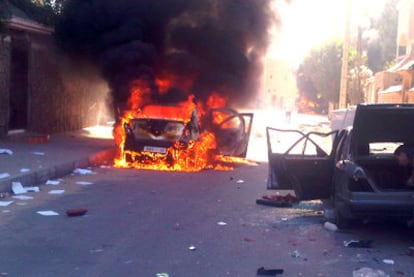Spanish government denies prior knowledge of Sahrawi camp storming
Moroccan police arrest 163 people for starting riots
The government vehemently denied on Wednesday that Morocco informed it beforehand that it was going to storm a Sahrawi protest camp in Western Sahara as EL PAÍS reported yesterday, quoting diplomatic sources.
"Nothing about the camps was discussed during the lunch and much less any possible expulsions," said Foreign Minister Trinidad Jiménez.
"I want to categorically deny the information that was published [Wednesday] that Morocco's foreign minister told me during a lunch that there was going to be some type of expulsion at the camp," she said during an official visit to Quito.
According to diplomatic sources, Morocco's envoy Taieb Fassi Fihri told Jiménez last week during a visit to Madrid that the army was going to dislodge the estimated 20,000 people at the Agdaym Izik protest camp. Spanish officials took note of Rabat's intentions because it was decided that the matter was one for the international community to deal with and did not affect bilateral relations, the diplomats said.
Monday's storming by elite troops has sparked waves of violent protests for the past three days across Laâyoune in which, according to the pro-independence Polisario Front, at least 19 Sahrawis have been killed and 723 people injured.
The Moroccan government said Wednesday that two more policemen were killed on Wednesday bring the number of officers killed to 10. King Mohamed VI announced that he will pay for the officers' funerals, the state news agency MAP reported. Moroccan security forces began rounding the alleged leaders of the riots in the Western Sahara capital. At least 163 people have been arrested.
Journalists have been prohibited from traveling to the disturbed areas.
The violence comes as Morocco celebrates the 35th anniversary of the Green March, when the current monarch's father, King Hassan, mobilized 350,000 unarmed Moroccan citizens to demonstrate his kingdom's claim to the former Spanish territory.
In 2002, the Swede Hans Corell, then under-secretary-general for legal affairs and legal counsel at the United Nations, issued an opinion for the UN Security Council, which stated that Spain could not in 1975 unilaterally transmit its power and, therefore, retains administrative control of its former territory, even though it cannot govern there.
In Congress, Cabinet Secretary Ramón Jáuregi also denied that the government knew beforehand of Rabat's intentions.
Without condemning Rabat's actions, the Spanish government has called for "calm and restraint" - a position that evoked a stream of criticism by human rights activists and members of the opposition.
On Wednesday, Jiménez defended Madrid's wait-and-see approach. "The easiest thing we could have done was to issue a condemnation. And what would that have achieved? Would the government be able to continue holding its privileged role as a mediator between all sides? We want to conduct foreign policy in a responsible and serious manner, knowing what Spain's interests are."
Ahmed Bujari, the Polisario's UN envoy, said he lamented the Spanish government's idle approach. "We would have liked for Spain to have lifted its tone, its voice, at least in the defense of the people," he told a radio station.
French Foreign Minister Bernard Kouchner called the disturbances in Western Sahara "very serious." Several Spanish parliamentarians have been prevented from visiting Western Sahara in recent days, without official condemnation from Madrid.
During his visit, Morocco's Foreign Minister Fassi Fihri told reporters that his government was not planning to storm Agdaym Izik, instead preferring dialogue.
The Moroccan government's spokesman Khalid Naciri later explained to EL PAÍS that criminal elements recruited by the Polisario had taken refuge inside the camp.








































